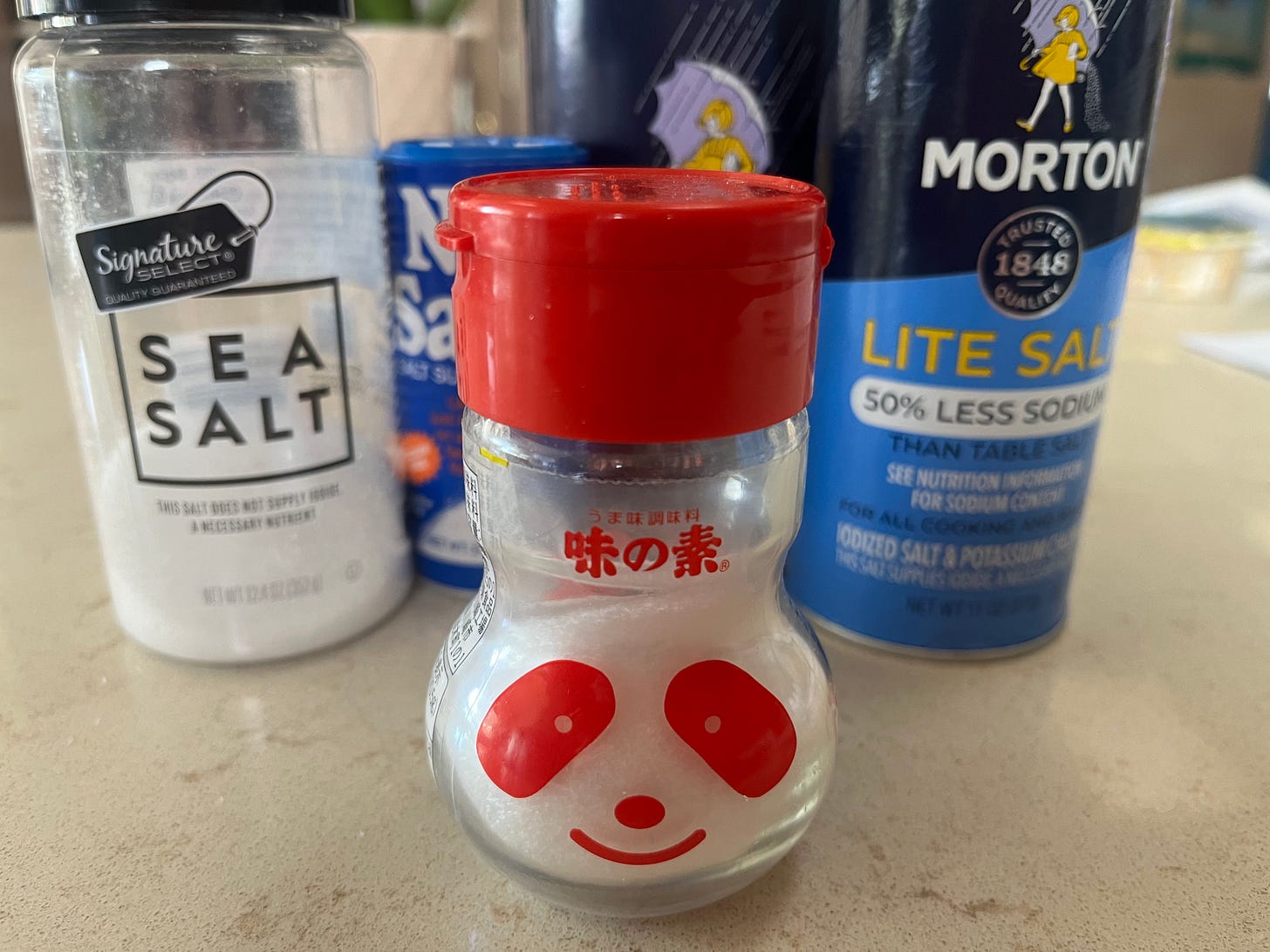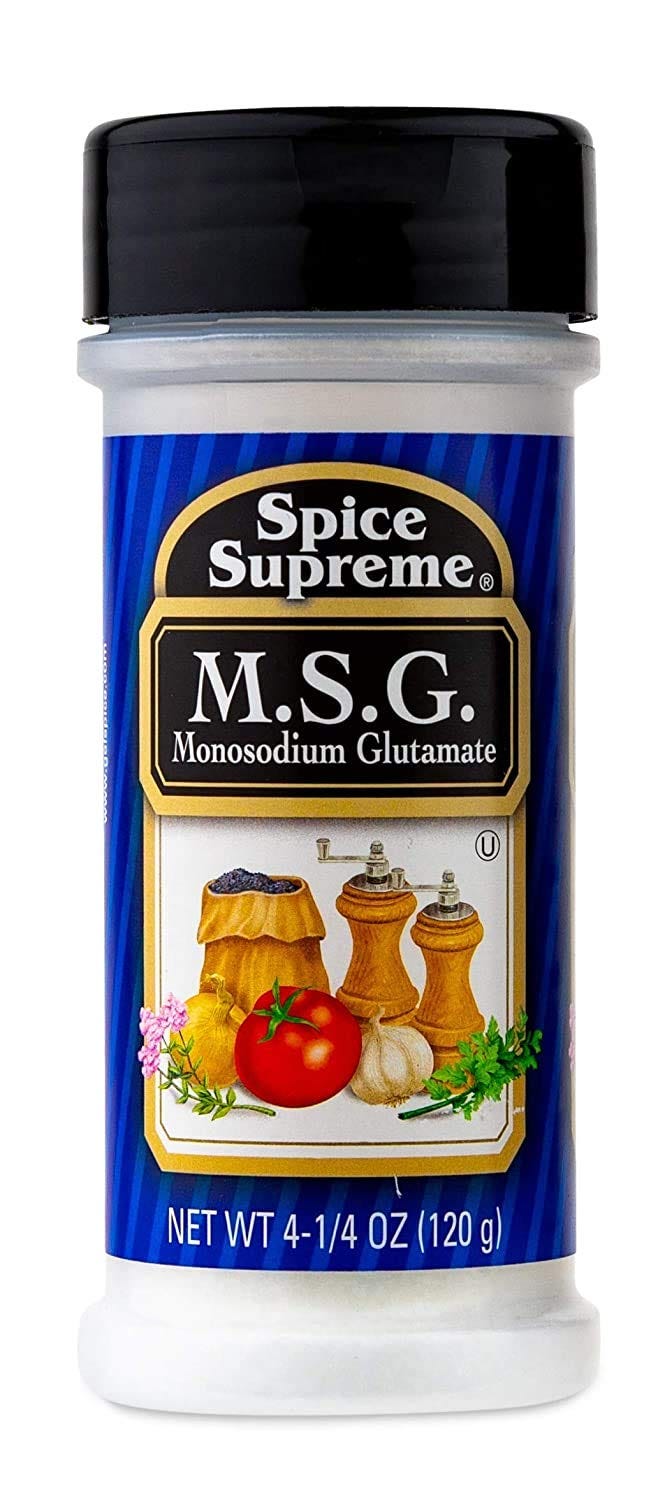Does Salt Intake Really Increase Blood Pressure?
If it does, and it appears to be a mighty big "if", here's a much reviled seasoning to the rescue.
Let me preface the following spiel by saying that I have serious misgivings about the alleged link between sodium intake and high blood pressure. All you've got to do is look at the whole fakakta history of America's war on salt to understand why.
Consider that in 1904, a group of French doctors, no doubt while resting between mock swordfights with baguettes, noticed that six of their high blood-pressure patients happened to also be salt junkies. This caused them to conclude that it must be the salt that was responsible for the high blood pressure.
"Mon Dieu! "No wonder their blood pressure goes up like our mistresses' bouffants! They like to put zee salt on zee bouef bourguignon!"
That's right, the scientists committed the scientific sin of conflating correlation with causality. Say you looked at 10 people who had bludgeoned their victims to death using a butternut squash. Then, while studying their habits or lifestyle for any clues, you noticed that they'd all seen at least one Kevin Bacon movie in the preceding week. You then shouted "Eureka!" and proclaim that watching Kevin Bacon movies causes people to commit violent crimes using a butternut squash.
That's pretty much what the French researchers did and it planted the "salt is bad" seed.
A few decades later, the salt phobia escalated when Brookhaven National Laboratory's Lewis Dahl released "unequivocal" evidence that excess salt causes hypertension. He came to this conclusion after inducing high blood pressure in rats by giving them the human equivalent of ingesting 500 grams of sodium a day.
Let's put that in perspective. Today, the average American ingests about 3.4 grams of sodium a day. In order to match what Dahl's rats were given, that average American would have to eat 2,380 of those 1-ounce bags of Doritos you see at the checkout counter. Every day. And that's not even counting the sodium in the salsa you'd dip the chips in.
Since then, more sensible studies have shown mixed results about the role salt/sodium plays in hypertension. Some large studies say the link is conclusive, while others say the link, if it exists, is negligible.
One big meta-report, funded by the U.S. Department of Health, did find that cutting salt intake reduces blood pressure. They looked at the result of 11 salt-reduction studies and found that low-salt diets did indeed decrease blood pressure, but only by an average of 1.1 millimeters of mercury for systolic blood pressure and 0.6 millimeters of mercury for diastolic blood pressure.
Ho-hum. According to science writer Melinda Wenner Moyer, writing in Scientific American, “That’s like going from 120/80 to 119/79.”
But let's give the anti-salt people the benefit of the doubt for now and accept that Americans should restrict their sodium intake.
It's with that in mind that I offer the much-reviled MSG (monosodium glutamate) as a viable and even healthful salt substitute.
MSG, Ain't that the Stuff in Chinese Food?
I know what you're thinking. MSG? Yeah, that's the "toxin" that causes "Chinese Restaurant Syndrome." Too bad there's no such thing. That damning label has its origin in a letter that was published in the prestigious New England Journal of Medicine in 1968.
In that letter, a Dr. Robert Ho Man Kwok described how he got sick after eating at a Chinese restaurant. He complained of generalized weakness, palpitations, and numbness in his extremities, all of which he blamed on MSG.
Similar letters soon filled the Journal's mailbox, but with additional complaints that included dizziness and chest and back pains.
Too bad the original letter was a hoax written by someone who used a pseudonym, no doubt some guy who owned a little-visited falafel shop in China Town and was tired of people bypassing his shop to eat Egg Foo Yung.
Soon after that charade, a study came out that "supported" the idea that MSG was dangerous. This study involved giving MSG to rodents (newborn mice) and it resulted in stunted growth, obesity, and nerve damage to several areas of their developing brains.
Okay, but I'm wondering if the study was done by a descendant of Lewis Dahl -- he of the 500 grams of sodium a day – because it also involved unrealistic doses.
What’s more, these large doses weren't fed to the mice. Instead, they were injected into their abdomens. I'm guessing that injecting substances into abdominal cavities isn't the best way to test the safety of a substance. Hell, I bet that even if you injected mother's milk, or whatever the magical stuff the elves drink in LOTR, into some creature's midsection, it would likely cause all kinds of hurt.
Anyhow, since then, multiple studies have overwhelmingly vindicated the use of MSG. It's now used extensively in South Asian cuisine for the flavor it provides and it’s often found on the dinner table in many other places around the world because of its flavor enhancing, sodium-sparing properties. High concentrations are known to be harmless, and the body eliminates the substance in just a few hours.
No Recorded Cases of Chinese Boob Syndrome
MSG is a sodium salt of the amino acid glutamic acid, the most abundant amino acid in nature. It's found naturally in meat, fish, poultry, hard cheeses, and mushrooms. It's even in breast milk and, to the best of my knowledge, there are no recorded cases of Chinese Boob Syndrome.
The chemical was first isolated in the early 1900's by Kikunae Ikeda, a Japanese chemist. He noted the flavor was distinct from the four basic tastes: sweet, sour, salty, and bitter. He named the flavor umami (Japanese for savory).
Ikeda figured out how to isolate glutamate from seaweed and stabilize it with salt, a process for which he gained a patent in 1908. He started selling the product under the name of Ajinomoto, a company which still exists today (although it now uses a different extraction method that uses beets, sugar cane, or molasses).
Oddly enough, MSG doesn't add flavor to a food. Instead, it changes the way our tastebuds perceive flavors by adding the fifth flavor – umami. There are receptors on the tongue that are awoken by MSG, some of which are exclusively aroused by glutamate.
So, when you add MSG to food, it enhances your ability to taste and enjoy the flavors related to meat and saltiness and, most pertinent to this article, it allows you to do this while only containing about a third of the sodium of table salt.
The "Salt Flip" Experiment
While I expressed my doubts about the supposedly iron-clad relationship between sodium and high blood pressure, excess sodium intake is universally recognized as being involved in other negative health diagnoses including stomach cancer, osteoporosis, and kidney disease.
Given all that, it may be a good idea to give seasoning your foods with MSG instead of table salt a try. This was exactly the idea behind the "Salt Flip" experiment, the results of which were published in 2020.
The experiment involved feeding 163 consumers three versions of various recipes, some with normal salt, some with reduced salt, and some with MSG. The consumers were then asked to rate the foods on overall liking of appearance, flavor, and texture/mouthfeel using a nine-point hedonic scale, preference, adequacy of flavor, saltiness, aftertast, likeliness to order, and sensory characteristics.
Consumers liked the MSG versions as well as the salted versions and considerably more than the low salt version, leading the researchers to conclude the following:
"Flip offers a promising dietary sodium reduction strategy through the addition of monosodium glutamate (MSG) to reduced-salt, savory, better-for-you foods that does not compromise consumer acceptance of their sensory profile."
So, rather than pouring salt on your food like Zeus pouring rain on the cornlands of the Athenians, you can instead use MSG. You cut down on sodium by virtue of using something that contains less of the chemical than table salt. You also might find, because of its flavor-enhancing characteristics, that you need to use an amount of MSG that's less than the amount of table salt you might use, which further cuts down on your sodium intake.
There's also another good reason to add MSG to your spice rack. It seems there are also glutamate receptors in the stomach, too, and when they're activated by glutamate, they stimulate gut motility and improve enzyme secretions. That, theoretically at least, leads to increased nutrient absorption, which is good.
References:
Jeremia Halim, et al, The Salt Flip: Sensory mitigation of salt (and sodium) reduction with monosodium glutamate (MSG) in "Better-for-You" foods, J. Food Sci, 2020 Sep; 85(9): 2902-2914.
HM Maheshwari, et al, Determining Efficacy of Monosodium Glutamate for Salt Reduction in Plain and Spiced ‘Poories’ Through Sensory Responses, Journal of Experimental Food Chemistry, 2017, 3:3.
MW Moyer, It's Time to End the War on Salt. Scientific American. July 8th, 2011.
Kerry Taylor-Smith, MSG: The Misunderstood Sodium Substitute, Technology Networks Applied Sciences, January 27, 2023.
AN Williams, et al. Monosodium glutamate 'allergy': menace or myth? Clin Exp Allergy. 2009 May;39(5):640-6.
Receptor Activated Exclusively by Glutamate Discovered on Tongue, Science Daily, October 10th, 2009.
###







So the up the Salt/Red Meat crew might be right?
Heya,
Classic TC...
As always, a pleasure.
Take care.